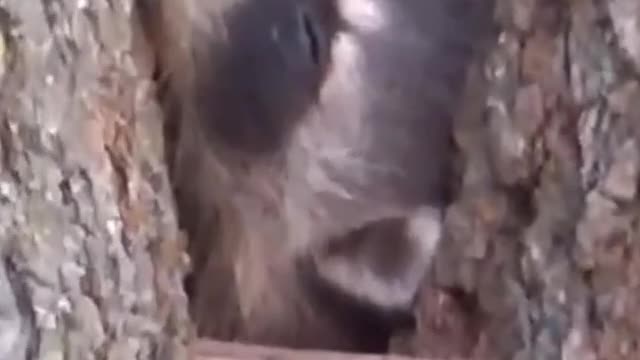Premium Only Content

Stuck in tree hole a baby raccoon.
Stuck in tree hole a beby raccoon.
The raccoon (/rəˈkuːn/ or US: /ræˈkuːn/ (listen), Procyon lotor), sometimes called the common raccoon to distinguish it from other species, is a mammal native to North America. It is the largest of the procyonid family, having a body length of 40 to 70 cm (16 to 28 in), and a body weight of 5 to 26 kg (11 to 57 lb). Its grayish coat mostly consists of dense underfur, which insulates it against cold weather. Three of the raccoon's most distinctive features are its extremely dexterous front paws, its facial mask, and its ringed tail, which are themes in the mythologies of the indigenous peoples of the Americas relating to the animal. The raccoon is noted for its intelligence, as studies show that it is able to remember the solution to tasks for at least three years. It is usually nocturnal and omnivorous, eating about 40% invertebrates, 33% plants, and 27% vertebrates.
Raccoon
Temporal range: Blancan–present[1]
PreꞒꞒOSDCPTJKPgN
↓
Raccoon climbing in tree - Cropped and color corrected.jpg
California raccoon (P. l. psora), Lower Klamath National Wildlife Refuge in California
Conservation status
Least Concern (IUCN 3.1)[2]
Scientific classificationedit
Kingdom:
Animalia
Phylum:
Chordata
Class:
Mammalia
Order:
Carnivora
Family:
Procyonidae
Genus:
Procyon
Species:
P. lotor
Binomial name
Procyon lotor
(Linnaeus, 1758)
Raccoon range.png
Native range in red, introduced range in blue
Synonyms
Ursus lotor Linnaeus, 1758
The original habitats of the raccoon are deciduous and mixed forests, but due to their adaptability, they have extended their range to mountainous areas, coastal marshes, and urban areas, where some homeowners consider them to be pests. As a result of escapes and deliberate introductions in the mid-20th century, raccoons are now also distributed across much of mainland Europe, the Caucasus, and Japan.
In Europe, the raccoon is included since 2016 in the list of Invasive Alien Species of Union concern (the Union list).[3] This implies that this species cannot be imported, bred, transported, commercialized, or intentionally released into the environment in the whole of the European Union.[4]
Though previously thought to be generally solitary, there is now evidence that raccoons engage in gender-specific social behavior. Related females often share a common area, while unrelated males live together in groups of up to four raccoons in order to maintain their positions against foreign males during the mating season and against other potential invaders. Home range sizes vary anywhere from 3 hectares (7.4 acres) for females in cities, to 5,000 hectares (12,000 acres) for males in prairies. After a gestation period of about 65 days, two to five young known as "kits" are born in spring. The kits are subsequently raised by their mother until dispersal in late fall. Although captive raccoons have been known to live over 20 years, their life expectancy in the wild is only 1.8 to 3.1 years. In many areas, hunting and vehicular injury are the two most common causes of death
-
 1:27:59
1:27:59
Kim Iversen
6 hours agoRFK Jr Declares No More Cheetos on Welfare? | Yale Confirms Long Covid Is Actually Vaccine Injury!
41.6K70 -
 1:08:43
1:08:43
The Charlie Kirk Show
3 hours agoTHOUGHTCRIME Ep. 74 — Charlie's Campus Return? Robo-Butlers? Garden of American Heroes?
46.8K9 -
 1:09:53
1:09:53
Slightly Offensive
3 hours ago $2.65 earnedIs the US Headed for MORE WAR Under TRUMP? | Guest: Scott Horton
22.9K8 -
 58:29
58:29
The StoneZONE with Roger Stone
3 hours agoRoger Stone Hails Confirmation of Kash Patel, Trashes Schiff for Attacks On Patel | The StoneZONE
29K8 -
 48:44
48:44
Man in America
8 hours agoA MASSIVE Global Financial Reset Is Coming—Are You Ready?
19.2K1 -
 1:15:42
1:15:42
Precision Rifle Network
1 day agoS4E5 Guns & Grub - The Best Rifle Under $2000
20.7K4 -
 1:02:54
1:02:54
Glenn Greenwald
1 day agoSouth Korean Economist Ha-Joon Chang on the Economic World Order, Trump's Tariffs, China & More | SYSTEM UPDATE #410
60.6K43 -
 1:02:27
1:02:27
Donald Trump Jr.
8 hours agoBye Mitch, plus Kash confirmed, Interview with AJ Rice | Triggered Ep.218
113K68 -
 1:12:27
1:12:27
The Amber May Show
10 hours ago $1.72 earnedWomen Of Rumble 02-20-25
24.8K6 -
 41:18
41:18
Kimberly Guilfoyle
8 hours agoToday, We Kash in on Equal Justice, Live with Ryan Walters & Daniel Turner | Ep.198
90.8K21